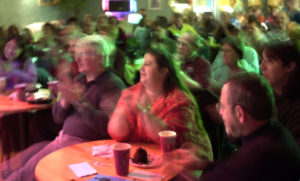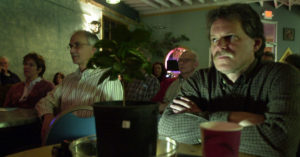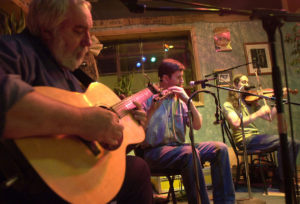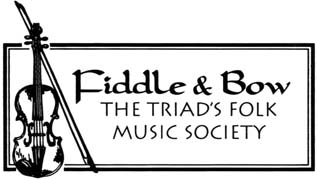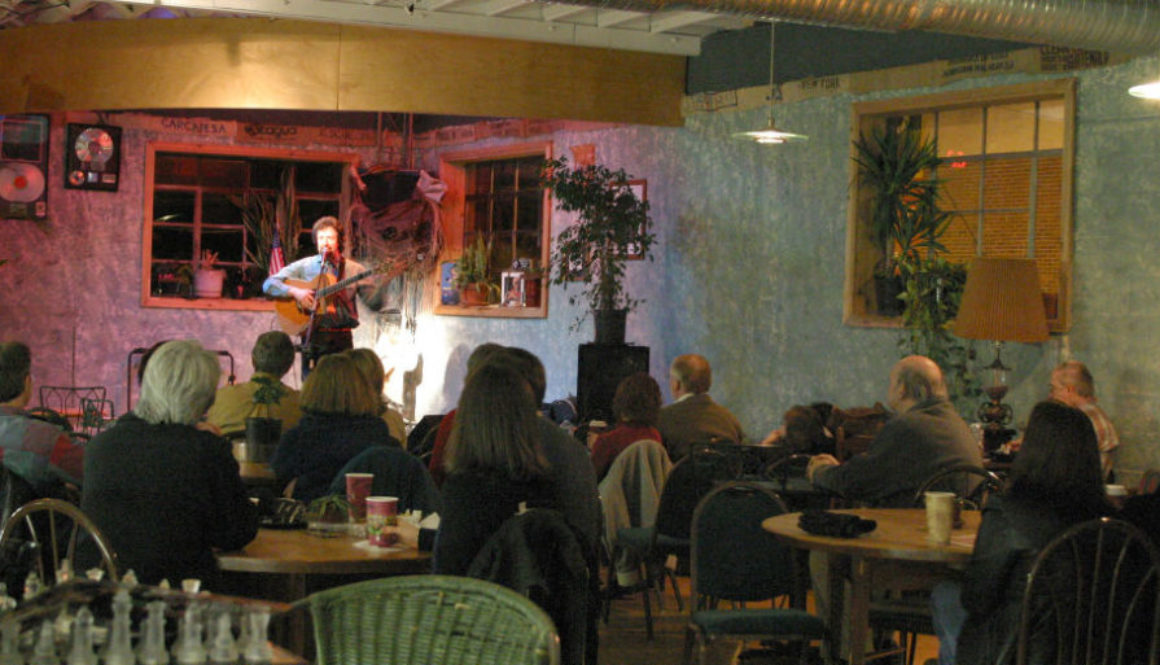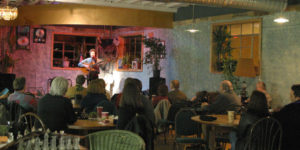Fiddle & Bow Society – This group of wayfaring music lovers is no stranger to the Piedmont’s folk scene
By Leigh Somerville Special to Go Triad
Greensboro News & Record
Brady could see the society’s influence all around him. He pointed to music lovers from High Point, Lexington, Greensboro and Pilot Mountain, all of whom drove to Winston-Salem for a Fiddle & Bow show at Morning Dew.
To Brady, that tells him something.
“Fiddle & Bow has been a major presence in the Triad,” he said.
The niche for that presence was co-created 23 years ago by Thomas, who at age 33 was married with a 6-year-old son, a job as a social worker and dreams of a career in folk music.
Thomas played guitar and mandolin in several local bands, most notably the Greensboro-based Mad Sweeney, and briefly entertained thoughts of graduate studies in folklore. Instead, he decided in 1978 to open The Hangman’s Beautiful Daughter, a folk-music shop, which was first on Hawthorne Road and then at Reynolda Village in Winston-Salem.
The shop lasted only a couple of years, but Thomas accumulated a mailing list of loyal customers, including Bill Stevens, a classically trained musician/composer who loved folk music.
“We decided the best way to take folk music to the public and create a good environment for local performers was to start a folk-music society modeled after one that existed in Chapel Hill at the time,” Thomas said.
Thomas and Stevens contacted the Chapel Hill group for information on how to form their own society, got a start-up grant of $1,000 from the local arts council and started a group named after instruments found in all folk music: the fiddle and bow.
Beginning in February 1981, the Fiddle & Bow Society presented a couple of shows a month at The Rose & Thistle. Before long, the society hosted a concert almost every week and produced a Saturday-night radio show on WFDD (88.5 FM) for 16 years.
It was during one of those radio shows in 1984 that Mary Callaghan, a special-education teacher who had moved to Winston-Salem from Illinois, heard about the Fiddle & Bow Society and joined.
Three years later, she became volunteer coordinator, organizing up to 100 volunteers during each annual Folk Fest on the lawn at Reynolda House. Since then, she also works with a pool of 25 members who sell tickets, arrange tables and chairs and house musicians each week.
Fiddle & Bow would never have survived without volunteers such as Callaghan, Thomas said. They are the ones who have devoted much time and energy to help the organization survive.
“The membership has stayed steady enough so we could keep some money in the bank,’’ he said. “But basically, we’ve had a corps of dedicated people who have kept it going.”
The group’s most recent president, Cheryl Kiser, discovered the Fiddle & Bow Society after moving from Ohio in 1995.
Kiser, who works as a social worker, said she started listening to folk music in the 1960s and became “addicted” to the socially active folk music of Joan Baez and Peter, Paul & Mary.
The Fiddle & Bow Society introduced her to a full range of other folk music, she said.
“Fiddle & Bow has been educational for me,” she said. “I’ve heard everything from Celtic music to music from South Africa. It has been a rich experience.”
But Fiddle & Bow has come up against some serious competition with the introduction of free summer concerts in Winston-Salem, she said.
In fact, responses to a survey sent out with the Fiddle & Bow’s February newsletter indicated that members are less likely to pay a cover charge to attend the society’s concerts during the summer when they can enjoy free music, buy a beer and mingle with friends in the streets downtown instead.
If it weren’t for Fiddle & Bow’s loyal membership and the deep niche it has carved for itself, that free entertainment surely would have put an end to the society, Kiser said.
“It’s a testament to how much the group has cared about keeping folk music alive,” she said. “For most of us, that’s what gives it value. It’s music we love, and we want to share it and keep the musicians working.”
Fiddle & Bow has benefited from the fact that, with the exception of Fourth Fret, it has never been charged rent by the businesses that have given it a home for the past 23 years.
During that time, the society’s membership has fluctuated from lows of about 200 to as high as 400 in the late ’80s and early ’90s, Thomas said. The membership now stands at about 300.
One of those members is Victoria Friendly, who 10 years ago joined the group after moving to Winston-Salem from New York, where she enjoyed folk music at The Bottom Line.
A language and reading clinician, she plays classical guitar, is a member of the Piedmont Guitar Orchestra, serves on the board of the Piedmont Classical Guitar Society and loves folk music because of its words.
“Folk is about words that cut to the quick,” she said.
It’s simple, said John Cardarelli, who has been a society member for the past 10 years with his wife, Louise Harris.
“I like rock ’n’ roll, but I always come back to folk,” Cardarelli said. “It’s roots are in what people are going through today. This is the real soul music. The songwriter’s soul is exposed in the music, and you can feel it in the room.”
On a recent Friday night show at Morning Dew, Callaghan makes change at the ticket table, Friendly fills in the last letter of her New York Times crossword puzzle, and Cardarelli relaxes in a favorite recliner — all wrapped up in the music coming from the front of the room.
On the stage, Godfrey exposes the soul of past and present fears when he pulls out old reliables from songwriters such as John Prine and gives new meaning to lines such as “Old trees grow stronger, old rivers grow wilder, old people just grow lonesome.”
Thomas sits alone nearby at one more table, one more concert, one more Fiddle & Bow Friday night, kept alive by a soul he explains with his simple folk-music style.
“We’re not just the audience; we’re part of what’s happening.”
Leigh Somerville is an award-winning freelance writer who lives in Winston-Salem.
